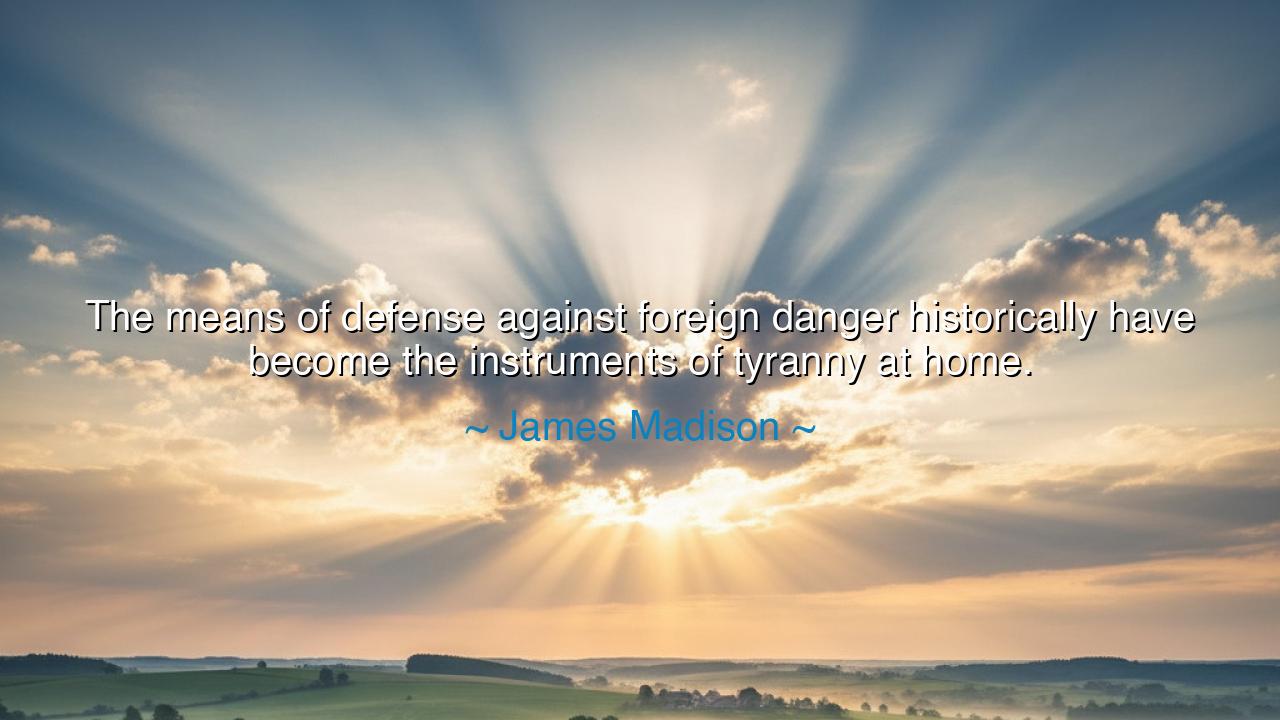
The means of defense against foreign danger historically have
The means of defense against foreign danger historically have become the instruments of tyranny at home.






“The means of defense against foreign danger historically have become the instruments of tyranny at home.” — James Madison
These solemn words, spoken by James Madison, the fourth President of the United States and one of the chief architects of liberty, carry the weight of ages. In them lies a warning as old as civilization itself — that power, once forged to protect the people from danger abroad, can become a weapon turned inward against those very people. “The means of defense”, said Madison, can swiftly become “the instruments of tyranny”, for the hand that guards may also learn to grasp. Thus, even the noblest institutions must be watched with the vigilance of the free.
Madison spoke from the crucible of revolution and the wisdom of history. He had studied the empires of the past — Rome, Athens, and the monarchies of Europe — and saw a pattern that repeated like fate itself. When nations, fearing external enemies, armed their rulers with extraordinary powers, those powers did not vanish when the war was done. Instead, they lingered like smoke after fire, settling into the chambers of government as permanent shadows. Kings and councils alike learned that fear was a mighty tool — and the people, weary of conflict, often surrendered their liberty for the promise of safety.
Consider the fall of the Roman Republic. Once a proud democracy of citizens and senators, it armed its generals to defend against foreign invasion and internal chaos. In doing so, it created men like Julius Caesar, whose command of armies abroad became dominion at home. Under the banner of protecting Rome, the republic was chained; and from its ashes rose the empire, gilded in power yet stripped of freedom. So it was that Rome, in defending herself, became the very tyranny she once defied.
Madison, witnessing the rise of standing armies and central authority even in his own young nation, feared the same fate. He knew that liberty is a delicate flame — easily extinguished by the winds of fear. To defend freedom, one must not only guard against foreign threats, but also against the slow, inward corrosion of power. “The instruments of defense,” he warned, are dangerous tools; once placed in the wrong hands, they seldom return to their proper place. Thus, the defense of freedom demands not only strength, but restraint.
The truth of Madison’s words has echoed through centuries. When the world faced great wars, nations expanded their armies, their secret councils, their surveillance, all in the name of security. Yet when peace returned, those instruments seldom slept. The French Revolution, which began in liberty, gave way to Napoleon’s empire under the pretext of defending the republic. In the twentieth century, regimes across continents invoked national security to justify censorship, imprisonment, and control — proving once again that fear is the father of tyranny.
But Madison’s teaching is not despair; it is a call to wisdom and vigilance. It reminds us that freedom, like a garden, must be tended even in times of storm. The citizens of a nation must question their leaders not out of defiance, but out of duty; for in democracy, watchfulness is love — the love that guards liberty from corruption. The means of defense are necessary, yes, but they must be bound by law, by conscience, and by the eternal principle that the power of the state exists only to serve the people, not to master them.
Therefore, O reader, learn from this wisdom of the ancients reborn in Madison’s age: Never trade your freedom for the illusion of safety. Be brave enough to face danger without surrendering the soul of your nation. Remember always that the sword drawn to protect the people must never be turned upon them. For history teaches this law with unerring justice — that the nation which arms itself without restraint will one day find those arms raised against its own heart.
And so, as the torch of liberty passes from one generation to the next, let us keep Madison’s warning alive: the defense of freedom begins with the defense against fear. Guard your courage, guard your conscience, and above all, guard the principles that make you free. For a people who remember this will never be slaves — not to kings, not to conquerors, and not to their own creation.






AAdministratorAdministrator
Welcome, honored guests. Please leave a comment, we will respond soon